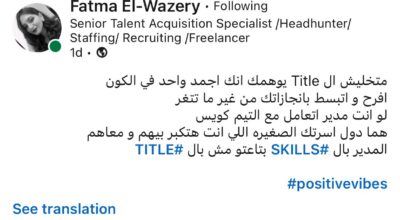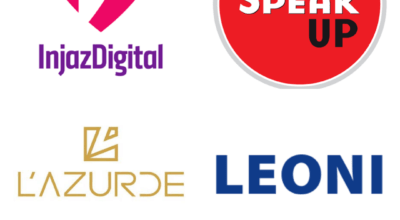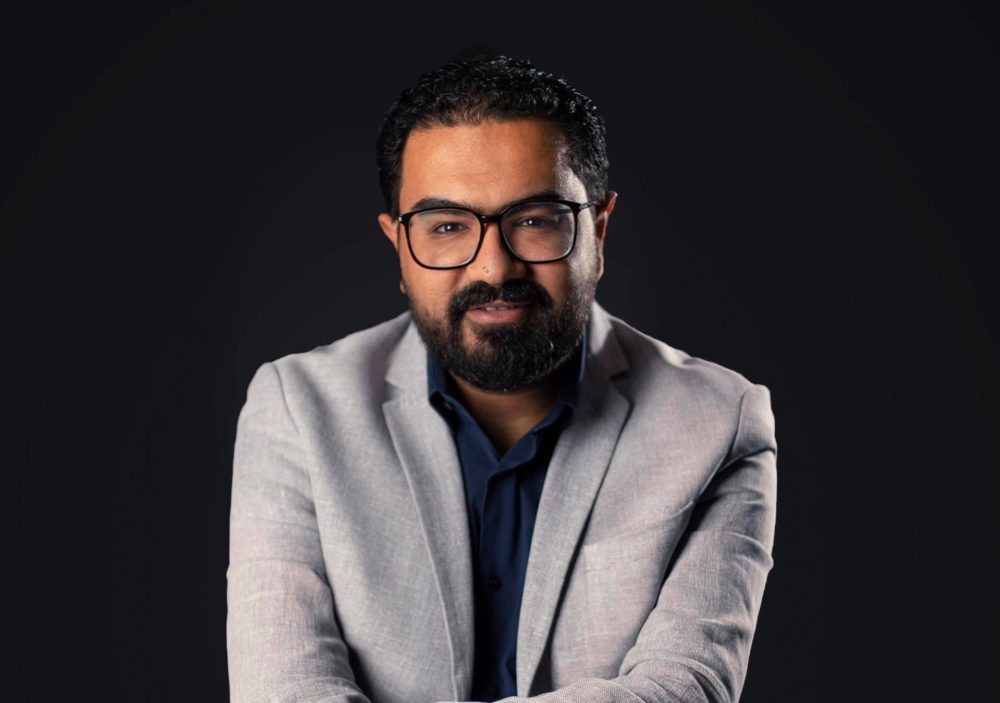Following a dreadful accident back in 2014, Ahmed Abu El Haz was hit with severe depression. “I needed to talk to a therapist to recover, but I was bedridden and I couldn’t move a muscle,” he recalled. “I searched for online therapy platforms to get help without leaving the house, but I found nothing in Arabic,” Abu El Haz said, describing the tragic situation that brought MENA’s first mental health platform, Shezlong, to life. Now Shezlong has raised over $450,000 (EGP 7,000,000) to grow and expand.
According to a fairly recent nation-wide survey by Egypt’s Ministry of Health, 25% of the country’s population suffers from mental illnesses. Add to that the findings of a 2019 survey by Statista exploring the difficult subject among Arab youth; “around 50% of the respondents in the region said seeking help for mental health issues is viewed as a negative thing by people”. And on top of all that, access to mental health professionals across the region is somewhat difficult. Shezlong was built to enhance this situation.
The area of mental healthcare remains largely untapped in Egypt’s startup ecosystem. How did Ahmed Abu ElHaz, CEO and founder of Shezlong, begin his journey into unchartered territories without any entrepreneurial background? We had a phone call with the founder to find out…
“I started off with no concept and no mindset to build on.”
The Seeds and First Steps of Shezlong
When Shezlong’s seeds were conceived in Abu ElHaz’s mind, he knew nothing about entrepreneurship. He was only set out to answer the question, ‘Why aren’t there any robust mental health platforms specific to the MENA region?’ “I started off with no concept and no mindset to build on,” clarified Abu ElHaz. “I simply wanted to help people seek the proper treatment they needed. Having never seen any startup adopt this idea, this was crossing unchartered waters for the whole MENA region; Egypt included.”
Like most Egyptians, he was also aware of the stigma surrounding therapy and felt that making it easy to access online will make avoiding that stigma easier. That’s why Shezlong participated in awareness campaigns on the subject of mental healthcare as well, and we’ll get to those in a bit.
With the end game in mind but no plan or enough experience on how to reach it, Abu ElHaz’s first steps were to “know the inner workings of this whole process (building a startup).”
According to Abu ElHaz, around 40% of Shezlong’s customers now are Arabs and individuals from the region living abroad. It’s also home to over 300 specialized psychiatrists and therapists that specialize in mental healthcare for children, families, couples, depression, anxiety, OCD, and more.
So, how did they do it?
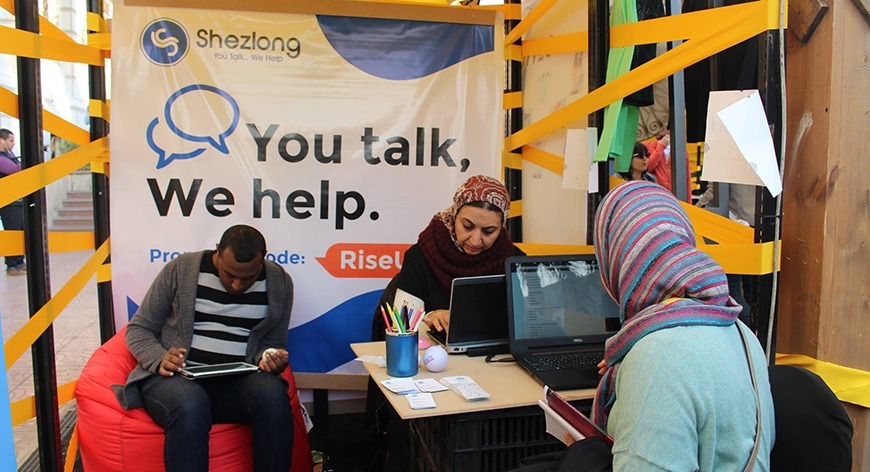
Shezlong participates in RiseUp 2016 testing depression levels. Photo via Al-Monitor.
“The core of the process was trial and error.”
Building a Team for Unchartered Markets

The Shezlong team. Photo via MENAbytes.com.
Having mentioned that online therapy wasn’t a commonly grasped idea, El Haz knew that the road to success would be a tiring one lined with resistance. Luckily, Shezlong had mentors and even startups who lent a hand during this time.
Successfully bringing a team together to help build it from scratch, without money or resources, was naturally challenging. “Back then, Egypt’s startup culture wasn’t fostered enough yet,” he elaborated. “Our solution was to take the risk of depending on agile college graduates and senior students to kickstart our journey.”
Getting therapists on board was a whole other challenge. “It was quite difficult to convince them to join us and provide their services under a name that wasn’t even out in the market yet,” he reminisced. “We started going to therapists who specialized in online therapy since they’d be more willing to join our platform.”
“The core of the process was trial and error,” asserted Abu ElHaz. “If you’re committed to the experience you’re about to embark on, and actually want to go through it, then you go through the whole of it while learning along the way from the obstacles you face and the people around you.”
Raising Funds To Begin and Grow, Even During the Novel Coronavirus Pandemic
In 2018, Shezlong raised $350,000 in a bridge funding round from 500 startups, Endure Capital, HIMangel, and other angel investors. With the dawn of the novel coronavirus pandemic, psychotherapists started moving online to salvage their business — enter Shezlong in its prime. And the startup raised further funds in June of this year.
These investments, according to Abu ElHaz, will help Shezlong broaden its services to include text therapy (because many people find videos inconvenient) and life coaching. It also got Shezlong one step closer to expansion into the Gulf area; especially in KSA.
“These awareness campaigns also act as an acquisition channel for the patient to know exactly what they need.”
Initiatives To Provide Access To Mental Healthcare in Times of Need, for Those Who Need It
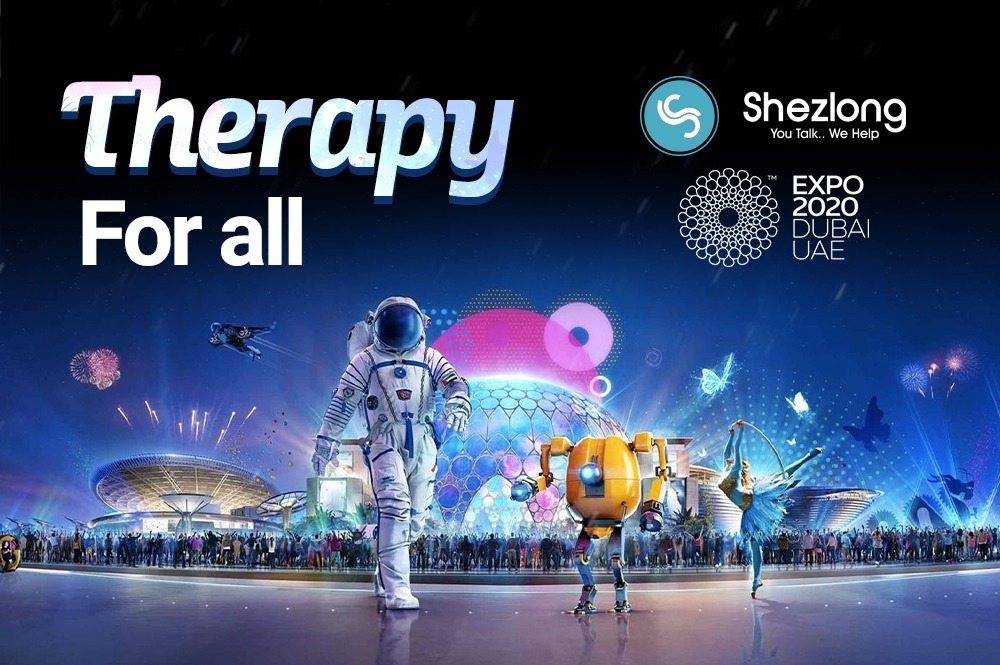
Shezlong collaborates with EXPO Dubai 2020. Photo via Shezlong.com.
This year, we witnessed Shezlong giving back to the community in times of crisis. First up was their initiative to give therapy sessions for the nominal fee of only EGP 10 “to ensure people commit to attending the sessions they book.” This was possible thanks to their partnership with Expo 2020 Dubai.
In partnership with Psych Clinics and other related entities, Shezlong launched ‘وقت القلق احنا معاك (In Times of Distress We Have Your Back)‘; a social media page that raises awareness on mental health issues that are aggravated or induced by this year’s pandemic. Through live Arabic therapy sessions on a variety of mental health-related topics, certified psychotherapists engage with the page’s followers on a regular basis for free.
Read more: ‘COVID-19 vs Our Mental Health: Can Online Therapy Really Help? We Ask an Expert‘
“These awareness campaigns also act as an acquisition channel for the patient to know exactly what they need,” added Abu ElHaz. Through them, Shezlong’s customers can identify whether they need therapy and what it could do to help them.
Shortly following the rise of the Egyptian ‘MeToo’ movement where many broke their silence about sexual harassment and abuse, Shezlong took it upon themselves to help sexual violence victims through free therapy sessions in their latest partnership with Instagram’s ‘Assault Police’.
“Persistence is the main attribute one must have to make it. And that goes for any business or company based in Egypt — especially if it’s a new idea — I can guarantee you it’s not easy.”
Lessons We Can Learn From Shezlong’s Journey
We finally asked Abu ElHaz to reflect on his entrepreneurial journey for insights and lessons to those who wish to swim against the tide as well. “I would say we’re all unique in our own ways, but persistence is the main attribute one must have to make it. And that goes for any business or company based in Egypt — especially if it’s a new idea — I can guarantee you it’s not easy.”
Secondly, and this may be strange coming from someone whose startup comes from a purposeful and personal background, Abu ElHaz thinks you “shouldn’t marry your idea.” When we asked him to elaborate more, he simply said, “It’s a company. You have to accept the probability of losing and the fact that your business can be stagnant and generate zero profits for months. This happened in my journey with Shezlong for years.”
You can visit the platform by clicking here.



